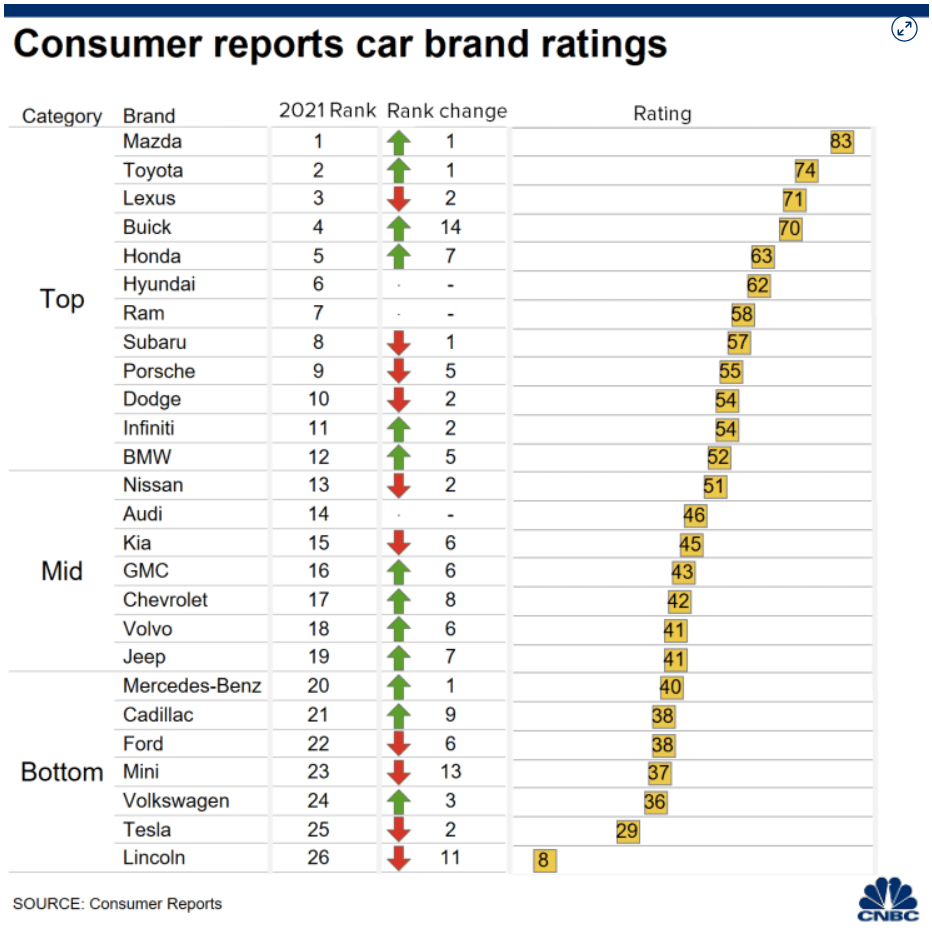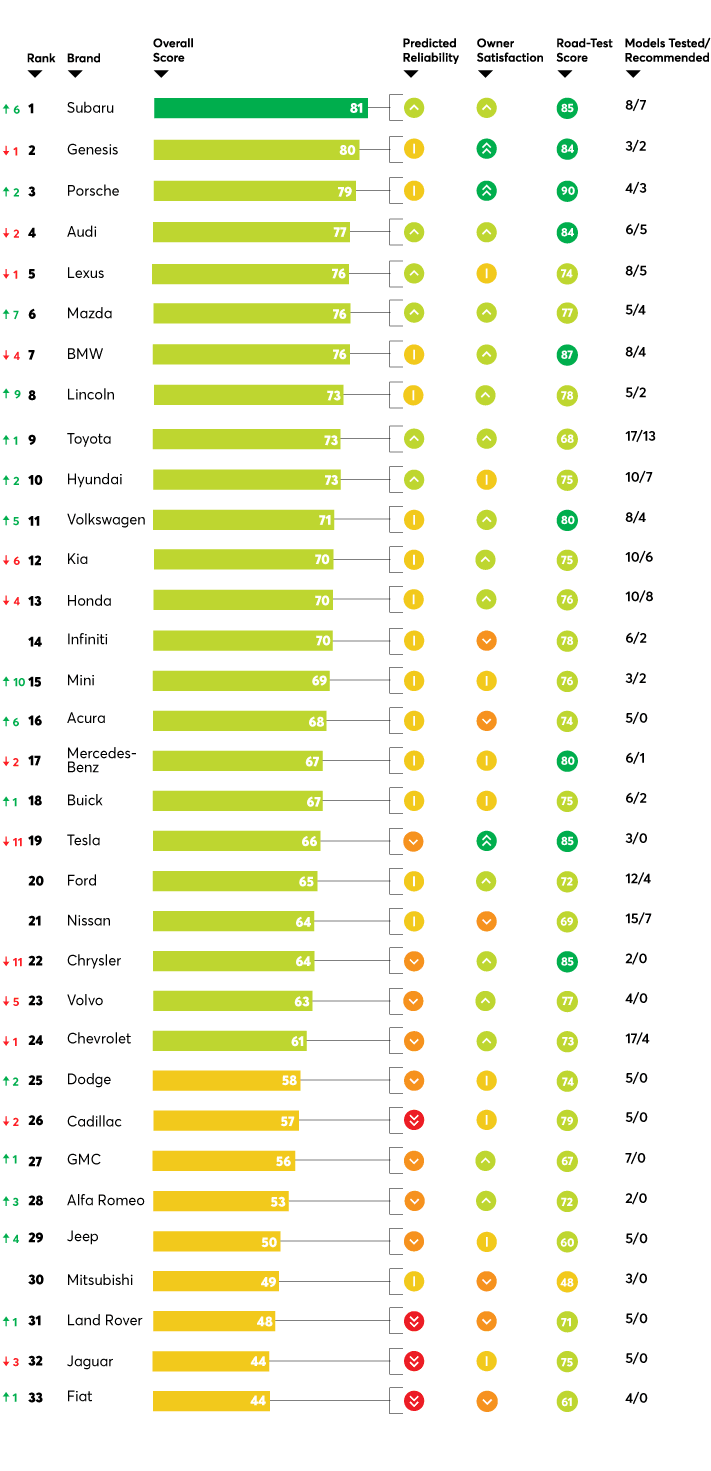2019 Car Brand Reliability: A Comprehensive Guide for Buyers and Owners
2019 Car Brand Reliability: A Comprehensive Guide for Buyers and Owners cars.truckstrend.com
Introduction: The Enduring Value of Automotive Reliability
In the complex world of automotive ownership, few factors weigh as heavily on a buyer’s mind as reliability. For a car, reliability isn’t just a buzzword; it’s the bedrock of peace of mind, financial prudence, and safety. When we talk about "2019 Car Brand Reliability," we’re delving into the performance track record of vehicles manufactured and sold during that specific year, as assessed through comprehensive data collected from real-world owners. Understanding which brands and models consistently performed well in 2019 is crucial, whether you’re considering a used car from that vintage or simply wish to comprehend the long-term dependability of a vehicle you already own.
2019 Car Brand Reliability: A Comprehensive Guide for Buyers and Owners
A reliable car translates directly into fewer unexpected repair bills, less downtime at the mechanic, and a higher resale value. It means your vehicle is more likely to start when you need it, perform as expected, and safely transport you and your loved ones. In essence, reliability is about the predictable, hassle-free ownership experience that every driver craves. This guide will provide a detailed look into the landscape of car brand reliability in 2019, offering insights, practical advice, and a clear understanding of what made certain brands stand out.
Understanding Car Reliability Metrics in 2019
Assessing car reliability isn’t as simple as counting breakdowns. It involves meticulous data collection and analysis from various reputable sources. For 2019, key organizations provided invaluable insights:
- J.D. Power: Known for its Vehicle Dependability Study (VDS), which measures problems experienced by original owners of 3-year-old vehicles (meaning the 2019 VDS would cover 2016 models, and their Initial Quality Study (IQS) would cover 2019 models in their first 90 days). Their reliability metrics are often expressed as "problems per 100 vehicles (PP100)," where a lower score indicates higher reliability. J.D. Power surveys cover a broad range of issues, from mechanical failures to infotainment glitches and fit-and-finish problems.
- Consumer Reports (CR): CR collects data from its subscribers on various issues they’ve encountered with their vehicles over the past 12 months, categorizing problems across 17 major areas (e.g., engine, transmission, brakes, climate system, in-car electronics). Their annual reliability surveys are highly influential, offering predictions based on historical data and owner feedback.
- RepairPal: This platform uses actual repair data from thousands of shops to estimate the frequency and cost of repairs for various models, providing a different, yet valuable, perspective on long-term durability.
- TrueDelta: Similar to CR, TrueDelta gathers owner-reported repair frequencies, often providing more granular detail on specific issues.

These sources often differentiate between "initial quality" (problems encountered in the first few months of ownership) and "long-term dependability" (issues surfacing after several years). While initial quality can be an indicator, long-term reliability often provides a truer picture of a vehicle’s enduring robustness. For 2019, we primarily focus on the latter, drawing from data that matured over time.
The Top Performers: Most Reliable Car Brands in 2019
Based on the cumulative data from the aforementioned sources for 2019 and subsequent years assessing 2019 models, a clear hierarchy of reliability emerged. Generally, Asian automakers continued their long-standing dominance.
- Lexus: Consistently at or near the top, Lexus (Toyota’s luxury division) exemplified reliability with robust powertrains, high-quality materials, and proven technology. Their focus on refinement over revolutionary tech often meant fewer new-model glitches.
- Toyota: The parent company of Lexus, Toyota, maintained its reputation for bulletproof reliability. Their models are known for longevity, low maintenance costs, and a strong track record across their diverse lineup, from sedans to SUVs and trucks.
- Mazda: Mazda continued its ascent in reliability rankings in 2019, often surprising some with its consistent performance. Their strategy of refining existing, reliable components rather than rushing new, untested technology contributed to their strong showing.
- Subaru: While some specific models had minor quirks, Subaru generally performed well, particularly with their Boxer engines and Symmetrical All-Wheel Drive systems proving durable.
- Kia & Hyundai: These South Korean brands have made remarkable strides in quality and reliability over the past decade. By 2019, they were consistently ranking among the top performers, offering excellent value and increasingly reliable vehicles, backed by strong warranties.
- Honda & Acura: Honda and its luxury division, Acura, remained strong contenders. Known for their refined engines and durable mechanicals, they continued to be a safe bet for reliability, though some newer infotainment systems occasionally drew minor complaints.
- Porsche: Among luxury European brands, Porsche often stood out for its impressive reliability, demonstrating that performance and dependability can coexist when engineering is paramount.


These brands often achieve high reliability through a combination of stringent quality control, extensive testing, and a tendency to introduce new technologies only after they’ve been thoroughly vetted.
Brands with Room for Improvement in 2019
While many brands excelled, others consistently found themselves on the lower end of the reliability spectrum in 2019 surveys. It’s crucial to note that "lower reliability" doesn’t necessarily mean a vehicle will constantly break down, but it does indicate a higher likelihood of encountering issues, which could range from minor annoyances to more significant mechanical problems.
- Land Rover/Jaguar: These luxury British brands frequently appeared at the bottom of reliability charts. Common issues cited included persistent electrical problems, complex infotainment glitches, and sometimes, more significant mechanical issues with engines and transmissions.
- Fiat/Chrysler/Dodge/Ram (FCA Brands): While improving, these brands often struggled with consistency. Issues frequently reported included infotainment system bugs, transmission quirks, and general build quality concerns.
- Tesla: Despite their innovative technology and strong sales, Tesla vehicles in 2019 often faced criticism for inconsistent build quality, panel gaps, paint issues, and problems with complex features like falcon-wing doors or advanced driver-assistance systems. Software glitches, while often fixable over-the-air, also contributed to owner-reported problems.
- Some European Luxury Brands (e.g., Mercedes-Benz, BMW, Audi): While offering impressive performance and luxury, these brands sometimes ranked lower due to complex electronic systems, expensive-to-repair components, and a higher propensity for niggling issues, though major mechanical failures were less common.
The challenges faced by these brands often stem from the rapid introduction of complex new technologies, sophisticated electronics, and, in some cases, less rigorous quality control processes compared to their top-tier rivals.
Factors Influencing 2019 Car Reliability (Beyond Brand)
While brand reputation is a strong indicator, several other critical factors influence a specific vehicle’s reliability, especially for 2019 models:
- Model-Specific Reliability: A brand might be highly reliable overall, but a particular model within its lineup could be an outlier. This often happens with newly introduced models, especially those with brand-new engines, transmissions, or infotainment systems that haven’t had time to prove their long-term durability. Always research the specific model you’re interested in.
- New vs. Established Technology: Cutting-edge technology, while appealing, often comes with initial teething problems. In 2019, this applied to advanced driver-assistance systems, complex infotainment interfaces, and novel powertrain designs. Established, well-proven technologies generally exhibit higher reliability.
- Maintenance & Driving Habits: The most reliable car can become a headache if neglected. Adhering to the manufacturer’s recommended maintenance schedule (oil changes, fluid checks, tire rotations, etc.) is paramount. Aggressive driving, frequent short trips, or driving in harsh conditions can also accelerate wear and tear, impacting long-term reliability regardless of brand.
- Recall History: Checking a 2019 model’s recall history through the NHTSA website can reveal known safety or design flaws that could impact reliability. While recalls are addressed, they indicate potential vulnerabilities.
Practical Advice for Buyers and Owners
Whether you’re looking to buy a used 2019 model or own one already, here’s actionable advice:
For Used Car Buyers (2019 Models):
- Research Specific Model Reliability: Don’t just rely on brand averages. Consult Consumer Reports, J.D. Power, and specific forums for the exact year and model you’re considering. Look for common complaints.
- Get a Pre-Purchase Inspection (PPI): This is non-negotiable. Have a trusted independent mechanic inspect the vehicle thoroughly before purchase. They can spot issues that aren’t apparent to the untrained eye.
- Check Vehicle History Reports: Services like CarFax or AutoCheck provide crucial information on accidents, service history, mileage discrepancies, and previous ownership.
- Demand Maintenance Records: A well-maintained car, even from a less reliable brand, can outperform a neglected one from a top-tier brand. Look for evidence of regular oil changes, fluid flushes, and timely service.
- Consider Extended Warranties: For models or brands known to be less reliable, an extended warranty can provide financial protection against unexpected repair costs. Understand its terms and exclusions carefully.
For 2019 Car Owners:
- Adhere to Maintenance Schedules: Follow your owner’s manual religiously. Timely oil changes, tire rotations, and fluid checks are the simplest ways to extend your car’s life and reliability.
- Address Warning Lights Promptly: Don’t ignore the "Check Engine" light or other warning indicators. Get them diagnosed and fixed quickly to prevent minor issues from escalating.
- Keep Detailed Records: Maintain a folder of all service receipts and repair invoices. This not only helps you track maintenance but also adds value if you decide to sell the vehicle.
- Understand Your Warranty: Familiarize yourself with your original manufacturer’s warranty (if still active) and any extended warranties. Know what’s covered and for how long.
Challenges and Nuances of Reliability Data
While invaluable, reliability data comes with its own set of complexities:
- Data Lag: Reliability surveys, especially those focusing on long-term dependability, often reflect issues from previous model years. The 2019 VDS (J.D. Power) for instance, would assess 2016 models. When evaluating 2019 models, we often look at the IQS (initial quality) for that year and then subsequent VDS reports as those vehicles age.
- Subjectivity of "Problems": What constitutes a "problem" can vary. A minor infotainment glitch might be reported, but it’s not as severe as a transmission failure. Surveys often don’t differentiate the severity of issues.
- Severity vs. Frequency: A brand might have many minor issues but few major ones, while another might have fewer issues overall but they are catastrophic.
- Small Sample Sizes: For less popular models or niche brands, the sample size of owners surveyed might be too small to draw definitive conclusions.
Summary Table of 2019 Car Brand Reliability Rankings
Please note: This table summarizes general trends based on various 2019 reliability reports and subsequent assessments of 2019 models. Rankings can vary slightly between different sources and over time.
| Brand | General 2019 Reliability Standing | Common Strengths | Common Weaknesses |
|---|---|---|---|
| Lexus | Excellent | Powertrain durability, interior quality, few issues | Infotainment (older models) |
| Toyota | Excellent | Longevity, low repair costs, robust engines | Some minor tech glitches, basic interiors on some models |
| **Mazda | Excellent/Good | Strong engines, good build quality, simple tech | Minor infotainment quirks, limited model range |
| Kia | Good/Excellent | Strong warranties, improving quality, value | Some early tech issues, brand perception |
| Hyundai | Good/Excellent | Value, extensive features, improving reliability | Similar to Kia, some initial tech kinks |
| Subaru | Good | AWD systems, engine durability (generally) | Some specific engine issues (e.g., oil consumption) |
| Honda | Good | Refined engines, solid engineering, reliability | Some infotainment issues, cabin noise |
| Acura | Good | Powertrain reliability, good performance | Less distinct styling, some infotainment issues |
| Porsche | Good/Excellent | Mechanical robustness, high-quality components | High cost of parts, complex electronics (less frequent) |
| Audi | Average/Good | Strong performance, luxurious interiors | Complex electronics, higher repair costs |
| BMW | Average | Driving dynamics, premium feel | Electrical issues, high repair costs, Niche engine issues |
| Mercedes-Benz | Average | Luxury, comfort, advanced features | Complex electronics, high repair costs, some minor bugs |
| Ford | Average | Truck/SUV reliability (some models), engine durability | Transmission issues (older automatics), infotainment bugs |
| Chevrolet | Average | Truck/SUV durability, V8 engines | Infotainment, some electrical glitches |
| Nissan | Average | Powertrain durability (some models) | CVT issues (specific models), interior quality |
| Volvo | Below Average/Average | Safety features, elegant design | Infotainment glitches, electrical issues, higher repair costs |
| Tesla | Below Average | Innovative tech, performance | Build quality issues, panel gaps, software bugs, sensor issues |
| Chrysler | Below Average | Value (some models) | Electrical issues, transmission problems, inconsistent quality |
| Land Rover | Below Average | Off-road capability, luxury | Electrical problems, high repair frequency, costly repairs |
| Fiat | Below Average | Unique styling | Numerous electrical and mechanical issues, poor durability |
Concluding Summary: The Pursuit of Reliability in 2019 and Beyond
Understanding 2019 car brand reliability is more than just an academic exercise; it’s a practical tool for making informed decisions. As we’ve seen, while Asian brands, particularly Lexus, Toyota, Mazda, Kia, and Hyundai, consistently led the pack in dependability, no brand is immune to issues, and no car is entirely problem-free.
The key takeaway is that reliability is a multi-faceted concept influenced by the manufacturer’s engineering prowess, quality control, technological choices, and crucially, the owner’s commitment to proper maintenance. For those considering a 2019 model today, thorough research into the specific model, a pre-purchase inspection, and a review of its history are paramount. For current owners, diligent maintenance remains the best defense against unexpected problems. Ultimately, a reliable vehicle is a testament to sound engineering, meticulous care, and a smart approach to ownership.
Frequently Asked Questions (FAQ) about 2019 Car Brand Reliability
Q1: Which car brands were generally considered the most reliable in 2019?
A1: Based on most major reliability surveys from 2019 and subsequent years assessing 2019 models, Lexus, Toyota, Mazda, Kia, Hyundai, and Subaru consistently ranked among the top for reliability.
Q2: Does reliability change significantly from year to year for a specific model?
A2: While overall brand reliability tends to be consistent, a specific model’s reliability can fluctuate if it undergoes a major redesign, introduces new engines or transmissions, or incorporates significant new technology. It’s always best to research the specific model year you’re interested in.
Q3: Are high-tech cars less reliable than simpler ones?
A3: Often, yes, at least initially. New and complex technologies (e.g., advanced infotainment systems, complex hybrid powertrains, intricate driver-assistance features) can introduce more potential points of failure or software glitches when first released. Established technology tends to be more reliable.
Q4: How important is maintenance for a car’s long-term reliability?
A4: Maintenance is absolutely critical. Even the most reliable car brand can suffer from premature wear and breakdowns if it’s not properly maintained according to the manufacturer’s schedule. Regular oil changes, fluid checks, tire rotations, and addressing minor issues promptly significantly contribute to long-term reliability.
Q5: Where can I find more detailed 2019 reliability data for specific models?
A5: You can find detailed reliability data by visiting the websites of reputable organizations such as Consumer Reports (subscription often required for full data), J.D. Power, RepairPal, and TrueDelta. These sites allow you to search by make, model, and year.





